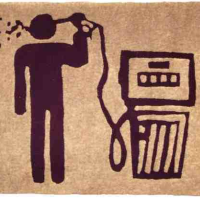Report Says Refineries Said to be Down During Gas Price Spike Weren’t

When gasoline prices in California spiked in May and October, the energy industry said it was a supply problem and blamed refinery outages for a shortage of gasoline production.
But a study released last week by McCullough Research “contradicts the industry explanations.” Using state regulatory data, the researchers said that increasing inventories of gasoline during the price rise indicated that supply was being withheld from the market, and refiners were producing it when the public was being told otherwise.
A Royal Dutch Shell refinery in Martinez was reportedly down for maintenance in May but emissions data suggests it was still working, the report said. Data also suggested that the Chevron Richmond refinery, which caught fire in August and closed down, was working for at least one of the two weeks it was reportedly down for maintenance in May.
But the report questioned whether changes in supply, if they actually did occur, would be enough to whipsaw gasoline prices. “West Coast gasoline prices are primarily determined by the world price of oil,” the report said in its introduction. “Inventory levels can also be significant, although with a smaller impact.”
But inventory, the report said, was not a factor: “The argument that the price spikes on the West Coast are caused by supply shortages is contradicted by the increasing gasoline inventories during the period of extraordinary prices.”
Senator Dianne Feinstein (D-California), who suggested in October that the federal government should investigate whether the price spike had something to do with “malicious trading schemes in the California gasoline market,” is credited with making state regulatory data available to McCullough for its study.
Energy companies do not lack incentives for manipulating prices. As the report pointed out, “Sudden shifts in the price of gasoline provide huge windfall profits to the refiners.” McCullough’s model of the California market indicated that the October prices were $.66/gallon higher than they would be normally, which translated a windfall profit of $25 million dollars a day in October.
McCullough researchers did not claim that their report was the last word on the price fluctuations, which could have been caused by something other than collusion among the principal suppliers. But they said the questionable behavior demands further investigation on a refinery-by-refinery basis and that the exercise of market power for oil needs the same kind of federal agency oversight afforded electricity, natural gas and coal.
–Ken Broder
To Learn More:
Study: California Refineries Operated During Periods Blamed for Gas Price Spikes (by Kevin G. Hall, McClatchey Newspapers)
Report: Western Refineries Made Gas During Price Spikes (by Michael Winter, USA Today)
Refineries Manipulating Gas Prices, Producing Fuel When They Say They're Not, According to Report (by Sandy Mazza, San Gabriel Valley Tribune)
May and October 2012 Gasoline Price Spikes on the West Coast (McCullough Research) (pdf)
Feinstein Wants Probe of Soaring Gas Prices, “Malicious Trading Schemes” (by Ken Broder, AllGov California)
- Top Stories
- Controversies
- Where is the Money Going?
- California and the Nation
- Appointments and Resignations
- Unusual News
- Latest News
- California Forbids U.S. Immigration Agents from Pretending to be Police
- California Lawmakers Urged to Strip “Self-Dealing” Tax Board of Its Duties
- Big Oil’s Grip on California
- Santa Cruz Police See Homeland Security Betrayal in Use of Gang Roundup as Cover for Immigration Raid
- Oil Companies Face Deadline to Stop Polluting California Groundwater





